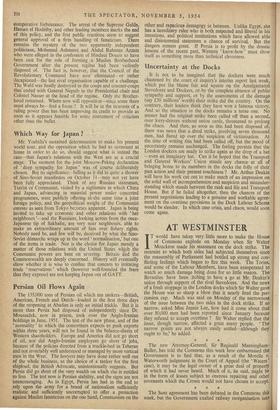Persian Oil Flows Again
The 135,000 tons of Persian oil which ten tankers—British, American, French and Dutch—loaded in the first three days of the reopening at Abadan is only an initial trickle. But it is more than Persia had disposed of independently since Dr. Moussadek, now in prison, took over the Anglo-Iranian holdings in June, 1951. The test of the new phase, and of the ' normality ' to which the consortium expects to push exports within three years, will not be found in the balance-sheets of Western shareholders. Europe and America did not go short of oil, nor did Anglo-Iranian employees go short of jobs, because of the policies directed from a truckle-bed in Teheran and not invariably well understood or managed by more vertical men in the West. The lawyers may have done rather well out of the whole business, as the choice of a tanker for the first shipload, the British Advocate, unintentionally suggests. But Persia did go short of the very wealth on which she is entitled to live. The test now is Persian stability, and the signs are not unencouraging. As in Egypt, Persia has had in the end to rely upon the army for a brand of nationalism sufficiently realistic and sufficiently uncorrupted to offer a protection against Muslim fanaticism on the one hand, Communism on the other and rapacious demagogy in between. Unlike Egypt, she has a hereditary ruler who is both respected and liberal in his intentions, and political institutions which have allowed able and disinterested statesmen a chance of survival But the dangers remain great. If Persia is to profit by the drastic lessons of the recent past, Western 'know-how' must show itself as something more than technical cleverness.


































































 Previous page
Previous page